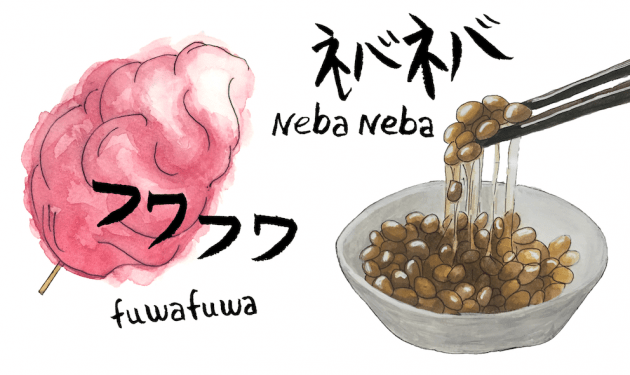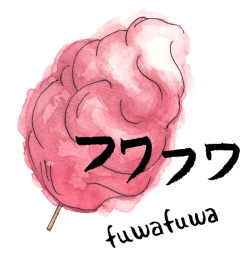
While living in Hokkaido and studying for the Japanese Language Proficiency Test, my friends and I surrendered to laughter every time we encountered Japanese onomatopoeia. Connecting these unique expressions with daily life as JET teachers became a useful, stress-free way to memorize them…
ガチャガチャ
Gachagacha. Stare at the toy dispensers by the entrance to the sushi restaurant. Point to the capsuled Pokemon and inflatable sushi toys. Ask what’s this. Open your sushi toy and inflate. Put it on the shelf and wonder what to do with it. Dispose of it with the burnable trash when it no longer brings you joy.
別々
Betsubetsu. Learn betsubetsu early when you go to pay at restaurants. Love it because you always go Dutch. Love it because you never need to tip and always know to pay at the cash register by the entrance. Admire the universality of splitting the bill.
ザーザー
Zaza. Forget your umbrella and buy one at 7-Eleven. Slip into your indoor shoes at school and smile as you don’t squeak and slide. When you leave, wonder which 7-Eleven umbrella is yours. Guess and hope for the best.

ペラペラ
Perapera. Allow teachers to compliment your Japanese after your self-introduction. Say hello. Say your name. Say you like skiing and are excited to live in Hokkaido. Say how your Japanese is no good and reject the compliment. Do not need false modesty. Recognize the formality of compliments.
ピカピカ
Pikapika. Listen to your students explain pikapika. Watch sun flash off car windows. Look at packages of spiffy candy and potato chips at Lawson. Learn where Pikachu’s name comes from.
ムシムシ
Mushimushi. Run at the Sky Park. Sweat through your shirt. Languish on the wooden floor in front of your one tiny fan. Think about buying another. Wonder if it’s worth it if you’re only here a year. Shower under cold water.
ゴロゴロ
Gorogoro. Hear thunder outside. Smell the rain in the genkan and smother it with your sneakers. Draw yourself under your kotatsu. Flip through things on your computer. Read the Internet. Read the clock and see it’s only two PM. Think about studying Japanese. Think about what meal planning for the week would look like.
ワクワク
Wakuwaku. Wait for Line to buzz your phone. Wait for something in your apartment in your small city. Wonder what people do for fun. Wonder if the fun will come to you. Make plans with teacher friends. Expect plans to get postponed from six to eight or nine PM once they can leave school. Smile when you meet up. Laugh. Speak perapera. Talk about how hard they work and answer questions about Amerika.
ネバネバ
Nebaneba. When the conversation gets quiet, talk about Japanese food. Talk about the things you can eat that will impress them. You can eat Nepalese-Japanese curry at full heat. You can eat tokoroten. You can eat natto. You can stir it viciously with chopsticks and pull the strings into the air like cotton candy. You eat, you smile, you say, it’s not that bad.
ゴチャゴチャ
Gochagocha. Take the JLPT in December just for kicks. Study your college textbook a few days. Study with your friends and when you start reading your notes, realize your scribbles make no sense. Try again in the summer and decide to be more organized.
ドキドキ
Dokidoki. Make an excuse to not study. Watch an anime with friends as a way to study. First crushes make cheeks blush and hearts beat dokidoki.

フワフワ
Fuwafuwa. Ski through snow and feel it puff away. Glide down mountainsides and watch the
valleys flatten in the horizon beyond these mountains. Eat curry at lunch. Go to an onsen after to dissolve ski sock scratchy legs and neck cricks. Repeat weekly. Repeat as often as possible.
ベタベタ
Betabeta. Ask what fuwafuwa means. It’s their snow. New England snow is betabeta. Back in New England, stick your skis into mashed potato snow, skid on ice, fall and feel the absence of cloud breaths. Wipe off your car in the morning and decide against the gym because your biceps
are sore. Bang off snow from your shoes in the genkan. Consider buying a kotatsu even though that’s what Honshu people do. Hear that foreigners in Hokkaido use them for a Japanese experience.
ボコボコ
Bokoboko. Break your arm skiing in middle school and conjure the moguls that did you in. Try anyway because the snow here is fuwafuwa. Bounce down the mountainside in syncopation. Know if you fall, there’s cushion to catch you.
モフモフ
Mofumofu. See fuwafuwa. Ask your students the difference. Speak like children. Eat candy. Watch cartoons. Fluff pillows.
ハラハラ
Harahara. Book Golden Week travel with your friends. Hold your breath when you click through multiple web browsers to purchase a series of plane tickets. Race against time to get seats on the same flights. Cheer when it all works out.
プチプチ
Puchipuchi. Go to Mombetsu to see the drift ice. Ride on a boat that cranks through arctic ice chunks. Pose by the giant crab claw on the side of the road. When you’ve done all there is to do, get kaisendon instead of their famous crab because you’re on a budget. Pop ikura with your teeth and feel the sea surge in you.
ビリビリ
Biribiri. Eat Nepalese curry with two friends. Slip out of your clothes in the locker room. Enter the sento. Feel its tiled walls around you. Hear a girl squealing on the other side over the divider wall. Let an old man laugh when you enter the bath. Wonder why this bathhouse feels different from the bigger one in town. Hear your friends yelp biribiri when they enter a small tub. Don’t ask what biribiri means. Your foot goes slack and then all of you does too when you step in and shocks manipulate your movements. Laugh. Cringe. Think about how best to get out.
ギリギリ
Girigiri. Get Starbucks at Sapporo Station and run with coffee to catch your train home. Go on a Golden Week trip with friends to Southeast Asia. Sleep in airports. Get food poisoning. Rush onto trains. Time things perfectly for Skin-of-Your-Teeth-Travel. Run. Pant. Rush. Take a picture. Laugh when you make it. Always make it.
バラバラ
Barabara. Study for JLPT N3. Learn onomatopoeic words. Wonder if barabara can describe people and how you will all disperse around the world after you go home.
キラキラ
Kirakira. Refer to pikapika. Know it’s different. Don’t understand how. Guess until you get it right.

Michael Colbert is a writer based in Portland, Maine. He loves horror film (his favorites are Candyman and Rosemary’s Baby), and he’s a coffee addict (his favorites are Costa Rican and Ethiopian). His work has appeared in such publications as Maine the Way, Avidly, and Germinal Magazine — and on the Kyoto Journal website (see “Soaring over Sorachi”)
Illustrations by Hinako Yukawa